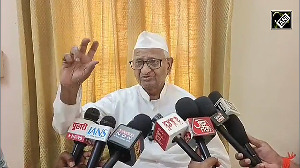India's energy deficit is likely to improve as hydro power stations can ramp up generation on account of adequate rainfall in the last fortnight of July, wiping out the shortfall of the previous months.
The cumulative storage position of 81 major reservoirs across the country has more than doubled to 74.3 billion cubic metres (bcm) at the end of second week of August, up from 33.38 bcm recorded a month earlier, according to the latest data from the Ministry of Water Resources.
This has increased generation from hydroelectric power stations to 12,850 gigawatt hour (Gwh) at the end of July, 22 per cent more than the generation in June, according to the Central Electricity Authority.
"Surplus water availability in reservoirs plays a major role in boosting generation, especially in north-eastern and northern regions," said Amit Kumar, energy expert with PricewaterhouseCoopers.
Hydel power constitutes nearly a quarter of India's total installed capacity of 150,000 Mw. These plants, which depend on rainfall and reservoir storage, are likely to produce the maximum in this season, when the rainfall is at its best.
However, poor rainfall in the first three weeks of July threatened to decrease the energy output from renewable energy, with power utilities fearing they would have to ration their energy distribution.
The peak power deficit in July increased to around 15 per cent, an increase of nearly 300 basis points from the previous month, primarily owing to poor performance of hydel power stations.
According to the data released by India Meteorological Department, the country continued to receive good rainfall during the week ended August 6, which is 7 per cent above normal. Rainfall was 1 per cent below normal on a cumulative basis between June 1 and August 6, the department said.
Only parts of Maharashtra and Karnataka continued to remain in the deficit rainfall region. Incidentally, both the states are experiencing more power cuts for different user segments.
"Good water availability in the past one month from the reservoirs has led to almost all of our hydro power plants generating surplus power. Bhakra power station is now running at its maximum capacity of 1,200 Mw. Other hydro power houses being benefited are Behar, Pong, Anantpur and Mukeria," said a senior official from the Punjab State Electricity Board.
In the northern region, where 11 major reservoirs are located, the total hydro power generation in July increased to 7,003 Gwh, compared with 5,968 Gwh generated in the previous month.
Of the total 81 reservoirs in the country, 36 have significant hydro power potential with an installed capacity of more than 60 Mw each. The ministry has said that in 24 of these major reservoirs, the storage build-up of water has risen more than the 10-year average storage of about 47 per cent.
Last month, however, without enough rains to feed the reservoirs, only 17 of these 36 major reservoirs had storage build up exceeding the last 10 years average.
Similarly, in 58 out of these 81 reservoirs the storage is more than 80 per cent of the average storage of previous 10 years. Last month however, only 45 reservoirs had such storage levels.







 © 2025
© 2025